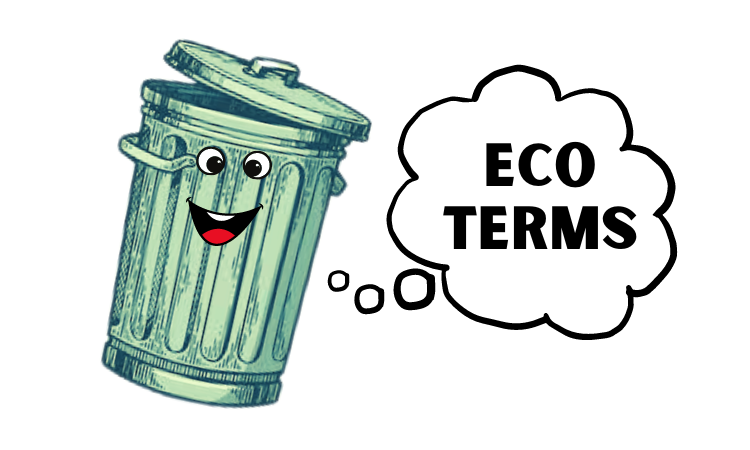Eco Terms (aka Sustainability terms you should know!)

Biodegradable: Capable of being broken down by natural processes into non-toxic components.
Carbon Footprint: The total amount of greenhouse gases emitted by an individual, organization, or product.
Carbon Neutral: Achieving a balance between emitting carbon and absorbing carbon from the atmosphere in carbon sinks, leading to no net increase in atmospheric carbon dioxide.
Circular Design: An approach to product design that emphasizes sustainability by creating products that can be reused, repaired, or recycled, minimizing waste and resource consumption.
Circular Economy: An economic system focused on eliminating waste and continually using resources through recycling and reuse.
Composting: The natural decomposition of organic matter into nutrient-rich soil.
Conservation: The protection and preservation of natural resources and ecosystems.
Downcycling: Converting waste materials into products of lower value or quality.
E-waste: Electronic waste, such as old computers and phones, that needs to be properly recycled.
Eco-friendly: Products or practices that are not harmful to the environment, often made from sustainable materials or designed to minimize environmental impact.
Eco-label: Certification indicating that a product meets specific environmental standards.
Eco-conscious: Being aware of and concerned about the impact of individual and collective actions on the environment, and actively making choices that promote sustainability and reduce ecological harm.
Ecological Footprint: A measure of the environmental impact of a person or community, often expressed in terms of the amount of land required to support their lifestyle.
Environmental Impact: The effect that human activities have on the environment, including both positive and negative impacts.
Environmental Stewardship: The responsible management and care of the environment and natural resources.
Food Waste: Edible food that is discarded, lost, or uneaten, contributing to environmental issues and resource depletion.
Greenwashing (aka False Advertising): When companies falsely claim to be environmentally friendly to attract eco-conscious consumers.
Incineration: The process of burning waste materials to reduce their volume, but it can create air pollution.
Landfill: A site for the disposal of waste materials, where they are buried and often lead to environmental issues.
Lifecycle Assessment (LCA): An evaluation of the environmental impact of a product or service throughout its entire lifecycle, from production to disposal.
Non-renewable Resources: Resources that are limited in supply and cannot be replenished within a human timeframe, like fossil fuels.
Plastic Pollution: The accumulation of plastic products in the environment, which poses risks to wildlife and ecosystems.
Pollution: The introduction of harmful substances into the environment, causing adverse effects.
Reduce: Minimizing the amount of waste generated by consuming less and choosing more sustainable options.
Refill: The act of replenishing a container with a product (such as food, beverages, or personal care items) instead of discarding the container and purchasing a new one, thereby reducing waste and promoting sustainability.
Refuse: The act of rejecting products or packaging that are harmful to the environment or unnecessary.
Recycle: The process of converting waste materials into reusable materials.
Renewable Resources: Natural resources that can be replenished naturally over time, like wind or solar energy.
Sustainable: Practices that meet current needs without compromising the ability of future generations to meet their own needs.
Sustainable living: A lifestyle that seeks to reduce an individual's or society's use of the Earth's natural resources by making conscious choices that minimize environmental impact, promote renewable resources, and support ecological balance.
Toxic (Hazardous) Waste: Waste materials that are harmful to human health or the environment.
Upcycling: Transforming waste materials into new products of higher value or quality.
Waste Diversion: The process of redirecting waste from landfills through recycling, composting, or reusing materials to reduce environmental impact.
Zero Waste: An approach to waste management that aims to reduce waste to the minimum by reusing and recycling materials.